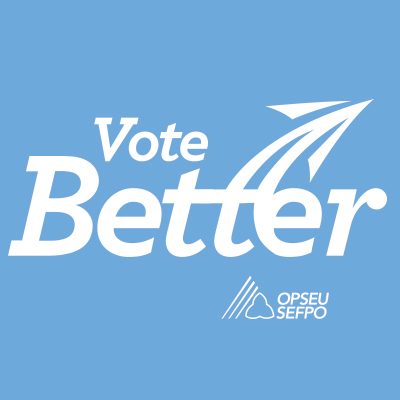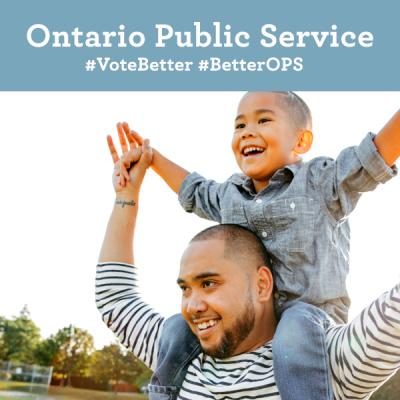Ontario Public Service


When the Ontario Public Service (OPS) is strong, Ontario is strong.
Across ministries, secretariats, and agencies, OPS employees make sure that Ontario works for Ontarians. They uphold our laws, deliver our justice services, protect our environment, ensure our workplaces are safe, build our infrastructure, and grow our economy.
They safeguard public health, steward our resources, keep our highways and roads safe, and support those in need. They do it all with professionalism and discretion, protecting our privacy and personal information.
And as members of a strong union, OPS employees are also leaders in establishing fair and decent working standards that set the bar for all workplaces.
An investment in the OPS is an investment in ourselves and our communities.
Together as Ontarians, we built and own one of the most safe and secure data centres in the world. So why are we contracting out government email to Microsoft?.
For decades, successive governments have experimented with privatization, contracting-out and downloading.
Now the evidence is in and it’s crystal clear: the Auditor General has confirmed that these policies lead to higher costs and lower quality services. Unfortunately, privatization is still on the table.
Technological advances can be a good thing, but they aren’t a replacement for caring and professional workers who are directly accountable to citizens.
Meanwhile, Ontario’s correctional system is in crisis. We spend less per offender than any other province and it shows: our institutions are crumbling and there is a critical shortage of correctional officers. An average of two correctional staff members are assaulted every day, while nearly one in three suffer from PTSD.
A better Ontario means #BetterOPS. Let’s #VoteBetter
Platform Priorities
As an employer, the Ontario government must set the bar for the fair and equal treatment of workers by closing the gender wage gap, and instituting a fair and open job evaluation system that will ensure equal pay for equal work.
The government must restore OPS employees to their proper salary step to recognize their length of service after they were forced to endure a two-year wage freeze.
Government must establish a fully public and accountable process to evaluate all proposals to privatize, contract-out, or outsource OPS services or programs. This process must include a credible and independent cost-benefit analysis of the proposal, and give members of the public and OPS employees meaningful input into the final decision.
Corrections
Investing in our correctional system will pay dividends to every single Ontarian. It will make all of our communities safer and more prosperous.
Properly designed, built, and staffed facilities will mean that correctional officers and inmates will be safer inside our facilities. It will also mean that when inmates are released, they’ll have the rehabilitation and support they need to re-enter our communities as lawful, productive citizens.
Investing in our correctional system will mean lower crime rates, lower overall correctional costs, and fewer mental health problems both in our facilities and in our communities.
5,000 offenders on probation orders violate their orders and “disappear” – every year.
Ontario’s correctional system is in crisis. We spend less per offender than any other province and it shows: our institutions are crumbling and there is a critical shortage of correctional officers. An average of two correctional staff members are assaulted every day, while nearly one in three suffer from PTSD.
Half of offenders have mental health and/or addictions issues. Officers have no special training on handling these offenders, and there aren’t enough correctional nurses to cope.
Probation and parole offices lack basic tools like metal detectors and safe interrogation rooms, meaning they can’t carry out basic rehabilitation services, or follow-up on offenders who have violated their probation orders.
Our communities can’t afford to let this crisis continue.
Platform Priorities
Ensure correctional officers and other correctional staff are safe while on the job.
Give the system the resources it needs (e.g., permanent new staff hires in all classifications, infrastructure additions and improvements) to support the transformation of corrections.
Ensure all corrections staff have ongoing training, particularly in the areas of mental health, direct supervision, core programming, and case management, where required.
Ministry of Community & Social Services
From the beginning, the Ministry of Community & Social Service has always been in flux. As the needs of society’s most vulnerable people have changed, so have the ministries’ programs and services.
But some of those changes have done more harm than good. Downloading, contracting-out, and privatization have led to instability, and lower levels of support.
That’s left clients unable to afford the basic necessities of life, often having to make an agonizing choice between paying for food, rent, clothing, heat, or medicine. To make matters worse, the privatized payment system SAMS (Social Assistance Management System) still won’t reliably issue the proper support to many people.
The human touch is also at risk of being lost. Automated online services can be difficult for people to navigate.
And with workers facing the highest caseloads in the country, clients here in Ontario have to endure long wait-times for even basic help.
High caseloads are an especially serious issue in the Family Responsibility Office, which works to ensure that court-ordered support payments are made. The result: too many children and families left to struggle without the support to which they’re entitled.
There are billions of dollars in outstanding payments that could be collected, but the FRO is too poorly staffed to collect them.
It’s a similar situation at Assistance for Children with Severe Disabilities. Unmanageable caseloads mean kids aren’t getting the therapy, medical supplies and care giver support they need.
As the Ministry moves towards online, one-stop shopping, it needs to keep at the forefront the personal contact that is needed for the most vulnerable citizens of Ontario. When communities thrive, Ontario grows to be a better and more inclusive place to live for all.
Platform Priorities
- Invest in the Ministry so it can prioritize “the human touch”
- Ensure manageable caseloads
- Maximum 230 cases per case worker at the Ontario Disability Support Program
- Maximum 230 cases per case worker at Assistance for Children with Severe Disabilities
- Maximum 300 cases per case worker at the Family Responsibility Office
- Appropriate Staffing levels
Ministry of Natural Resource and Forestry
As with all ministries in the OPS, privatization is the major issue facing Natural Resources and Forestry. Sections and even entire programs are being cut, contracted-out, or privatized, leaving employees to do more with less.
Precarious work appears to be increasing and more employees are working more than one job just to make ends meet. Some even end up using social assistance programs if they are unable to find employment.
The ministry needs a hiring process that is fair and transparent. It’s time to stop the nepotism and hiring of friends of managers.
Health and safety is another ongoing issue, especially in in the northern offices, because of the privatization of the clearing and salting of office parking lots and walkways.
Another issue is the announcement of the closure of the Angus Seed Plant near Barrie, which has prompted a loud outcry from customers, municipal councillors, and private companies that work in the forestry industry.
In operation since 1923, the seed plant provides many of the seeds used in reforestation projects across the province. It is an essential service in the fight against climate change. This facility extracts, cleans, tests, and stores billions of seeds each year and supplies over 50 native species to nurseries. Putting this kind of responsibility into private for profit corporations makes no sense. To protect our forestry industry and to avoid the risk of bringing other species into the province, the seed plant must not be closed.
Pilots in the Ministry are forced to work long hours without proper compensation as outlined in their collective agreement.
Keep our Provincial Parks public.
Keep our wilderness safe by providing the proper staffing levels of Conservation Officers who protect our wildlife from poachers.
Platform Priorities
- Do not close the Angus Seed Plant and keep it public
- Bring building maintenance work back under public management
- Pay employees proper compensation as negotiated in the contract
Treasury Board Secretariat
Despite the fact that the Auditor-General has found that the government abuses the use of consultants, the heavy use of consultants continues. For a much more reasonable cost, public service employees could do much of the work that is being privatized to consultants.
The increasing use of digital communications is a good thing, but the government must fulfill its responsibility to guarantee the safety of the citizens’ personal information.
High-profile data loss and security breaches like those suffered recently by Equifax and Metrolinx are becoming commonplace; the government must complete an enhanced risk assessment before continuing with its “Digital Government” initiative.
Security is also a concern with the government’s increasing use of Microsoft’s cloud-based email service “Office 365.” The province has its own secure data storage facilities – why are we risking data breaches by privatizing this service to a multinational?
The digitalization of government poses other risks, too: removing the crucial “human touch” from effective service delivery, and increasing the amount of precarious work in the province.
Platform Priorities
- Keep Ontario citizen’s personal data within Ontario to ensure it is protected
- Invest in the Ministry so it can prioritize “the human touch”
- Reduce the number of consultants in accordance with the Auditor General’s Report
Ministry of Government and Consumer Services
The Ministry of Government and Consumer Services is overseeing a massive transformation in the Ontario Public Service. It has many programs such as ServiceOntario, Ontario Shared Services, and the land registry. The Ministry provides customer protection and public safety.
More than two-thirds of the province’s 300 ServiceOntario Centres are privately owned and managed, leaving people across the province with slow and unreliable service. The Auditor General has found that long wait-times are more likely at private centres, which also offer fewer services. And in some communities such as Belle River and Val Caron, people have been left in the lurch by sudden and unexpected closures.
The Ministry also oversees payroll and benefits for most government employees. It is a large, complex system that requires skilled workers and appropriate staffing levels. Appropriate investment is crucial to ensure employees continue to be paid properly and promptly.
Platform Priorities
- Bring privatized ServiceOntario Centres back under public ownership
- Stop the privatization of services in other departments
- Invest in staff development to meet the needs of technological change and Digital Government
Ministry of Transportation
According to its website, the Ministry of Transportation “strives to be a world leader in moving people and goods safely, efficiently and sustainably to support a globally competitive economy and a high quality of life.”
But since 1996, the government has been reducing the efficiency and sustainability of the Ministry by outsourcing, privatizing, and selling off vital Ministry services such as winter highway maintenance and driver testing. This has led to staff cuts, experience loss, and less accountability.
In 2015, the Auditor General found that privatized snow-clearing was slower and therefore more dangerous than public plowing. And the financial collapse earlier this year of the UK multinational Carillion, which had contracts to plow more than half of the province’s highways, was a stark reminder of the risks of privatization.
Platform Priorities
- Increase internal staffing and reduce the use of consultants working at a much higher cost
- Bringing management of highway maintenance back under public management and oversight
- Ensure greater consultation on technological change and software changes specific to Ministry functions
- Update the job classification system and associated wages so the ministry can attract and retain the right people in the right jobs
Ministry of the Attorney General
The Ministry of the Attorney General (MAG) promotes itself as “an innovative, sustainable and responsive justice system that inspires public confidence and upholds the rule of law.”
But many courthouses across Ontario are operating at or above capacity, reducing the ability of staff to effectively and promptly deliver justice.
To address this pressure, the ministry is using fixed-term contract staff to perform professional and sensitive work. This has led to poor job stability, high employee turnover, precarious work, and an increase in training and recruitment costs.
The present classification assignment doesn’t reflect the multi-faceted work staff do: serving clients at public counters or in the courtroom, understanding a variety of federal and provincial legislation, rules, and procedures, and effectively providing advice and guidance to clients.
Physical infrastructure must be improved and modernized, but the Ministry must not disregard the need for ergonomic enhancements inside courtrooms, many of which were designed for in the age of pen and paper.
Technology inside courtrooms continues to be a blunder with under-resourced equipment and training to staff to deploy these systems.
Platform Priorities
1. New classification series that recognizes the justice sector responsibilities
2. Established ratio and reduction of fixed-term employees, with more full-time positions
3. Increased tracking of data and responsive tools for high work volumes
4. Provide adequate and up-to-date equipment and proper training to front line staff
Ministry of the Environment and Climate Change
The goals of the Ministry of the Environment and Climate Change are to protect our environment and our health, and to promote a strong, sustainable economy.
However, the privatization of environmental inspections and the trend towards industry self-regulation and fewer environmental protections is leading to fewer and fewer rigorous inspections.
Government is playing a smaller role in protecting our environment, and more responsibility is being place on private corporations and industries, opening the door to weaker standards and corruption.
Ministry inspectors are currently not deployed to environmental spills after hours, putting the environment, citizens, and their communities at risk.
Appropriate training and equipment is necessary for ministry inspectors to carry out assigned duties such as inspections, investigations, and call outs as prescribed by legislation.
An ongoing problem with unfilled staff vacancies continues to exacerbate these important issues.
Who is watching the land, air, and water?
Platform Priorities
- Bring back into the public domain oversight of waste reduction to ensure environmental protection
- Invest in more environmental inspectors and reduce its reliance on industry self-regulation
- Invest in proper staffing resources and training to fully respond to environmental incidents at all hours






